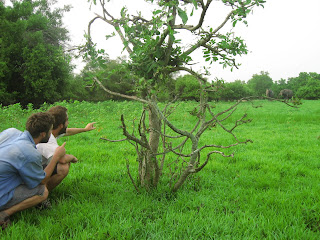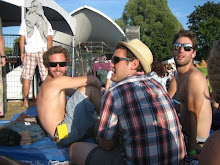
So it's been a few months now of us blathering on and cracking lame jokes when we have the time and you reading our blathers and laughing politely. But we realized recently that we haven't yet told you about our foundation. Designed to fill in the gaps left or overlooked by pre-existing NGOs, the Umoja Foundation Without Borders (Umoja for short) has been on a ground-breaking innaugural microcapital injection tour since early March.
Umoja is based on a few simple principles that guide our basic actions and development work.
1. A hands-off policy towards development that doesn't bog down progress with bureaucracy, lofty goals, specific skills, or actual work.
2. A conservative approach towards capital investment recipients, whereby basic business structures remain unchanged and adequate returns to investment are stringently evaluated.
3. A comprehensive grassroots approach that covers diverse avenues of investment.
These principles translate into some key day-to-day interactions and activities that demand full commitment from the founding fathers and primary donors. A typical day involves multiple street-level capital injections to entrepreneurial recipients with culinary leanings (ie. big mommas). Collaboration is always encouraged between recipients (avocado hawker plus bread monger equals sandwich delight). In the transportation sector (ie. motorcycle taxis), a small amount of available funds are often aggressively bid on leading to a highly intensive interview process to determine the recipient that will provide the right rates of return to donor investment. One large daily investment is also reserved for the enterprise in the hospitality sector (brothels excluded) that adequately demonstrates a low-overhead business model.
Quotes from the founding fathers:
"I like to start my daily injections off with a 500CFA minimum donation to the cafe with the best hot spaghetti." - D
"It's important not to be disillusioned with the impact we're really having in these communities. I go to bed every night feeling great about the numerous lives I've changed that day." - P
"As has been clearly demonstrated in other development programs, too much capital investment can be just as detrimental as not enough. I always make sure to get the right price for the fair amount of goods and services." - E
"There's no way it costs that much for a ride across town. I'll give you half that or we'll find another recipient." - D
"This FanIce [ice cream in a bag] is not up to Foundation temperature standards. Do you have a colder one?" - P
"What's your cheapest beer?" - E
If you're inspired by everything you've read today and think that Umoja provides realistic, sustainable solutions to real microeconomic development problems, you may consider a small financial donation. Alternately, the organization is run on a volunteer basis with both 6- and 4-month placements. If you would like to apply for a future project or donate, please send pertinent information and three relevant references to umojayes@gmail.com. We also accept both blank and filled-in cheques.
The thing about Umoja Foundation is, what did you think we were doing here?





















